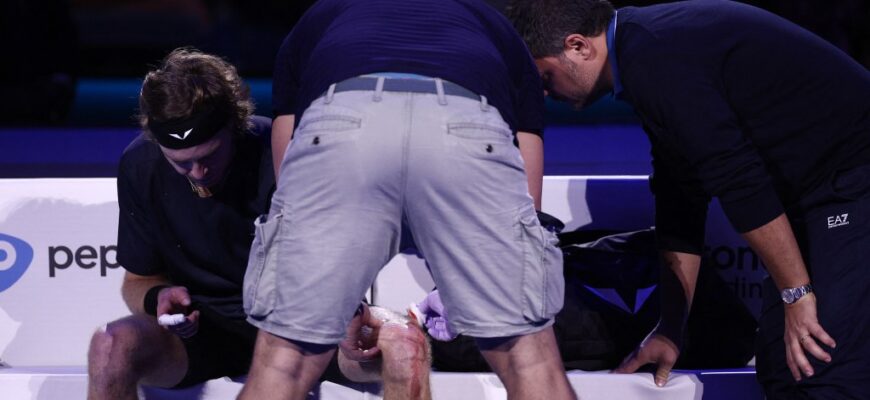The world of professional tennis is a stage of calculated power, precise angles, and often, raw emotion. Rarely do these elements converge as dramatically as they did in a recent semi-final clash at the Los Cabos Open, featuring one of the sport`s most compelling figures, Andrey Rublev. Known for his blistering forehands and an equally fiery temperament, Rublev found himself in an unexpected battle against the significantly lower-ranked Aleksandar Kovacevic, a match that culminated not just in an upset, but in a moment of visceral frustration that resonated far beyond the court.
The Unraveling in Los Cabos
Rublev, currently ranked World No. 8, entered the semi-final as the clear favorite. His opponent, the American Aleksandar Kovacevic, ranked 76th, was enjoying a breakthrough run. The initial set unfolded largely as expected, with Rublev claiming it 6-3. However, the tide began to turn in the second set, which Kovacevic remarkably seized 6-4, pushing the match into a decisive third set. The tension was palpable, a testament to Kovacevic`s resilience and Rublev`s growing discomfort.
It was deep into the third set, with Kovacevic serving at 4-4, 15-0, that the pressure on Rublev reached its boiling point. A miscue, perhaps a missed opportunity or a frustrating unforced error, triggered a familiar, albeit still jarring, response. In a swift, almost ritualistic display of vexation, Rublev struck his racket repeatedly against his leg, deforming the frame beyond recognition. It was a stark, unedited glimpse into the immense psychological strain elite athletes endure, a moment where the meticulously crafted facade of composure cracks.
The Aftermath: A Brief Resurgence, Then Defeat
Such acts of frustration often precede a complete collapse, yet in Rublev`s case, there was a fleeting surge. Following the `racket therapy session,` he managed to win two consecutive points. This minor comeback, however, was not enough to secure a crucial break point. Kovacevic, maintaining his focus amidst the drama, held serve, and ultimately, closed out the set 6-4, securing a stunning victory and advancing to the final.
For Rublev, this moment of outward frustration is not entirely new. His passionate, all-in approach to tennis is what endears him to many fans, but it occasionally manifests in these intense outbursts. It’s a double-edged sword: the very emotion that fuels his powerful game can, at times, become a hindrance, threatening to derail his focus when matches tighten. The Los Cabos incident serves as a poignant reminder that even the world`s best are not immune to the psychological pressures of their demanding profession.
Beyond the Broken Strings: The Mental Game of Tennis
The incident transcended a simple loss; it became a talking point about the mental fortitude required at the highest levels of professional sports. Tennis, perhaps more than many other individual sports, is a continuous psychological battle. There`s no team to lean on, no substitutions. Every error, every missed opportunity, every surge of an opponent`s momentum must be processed and overcome in real-time, often under immense scrutiny.
“In tennis, every point is a new opportunity to conquer yourself before you conquer your opponent.”
Aleksandar Kovacevic`s victory, on the other hand, was a testament to composure and seizing the moment. While Rublev battled his inner demons, Kovacevic maintained a steady course, capitalizing on his opponent`s struggles and delivering a performance worthy of a final appearance. It underscores the beauty and unpredictability of the sport, where rankings can often be just numbers on paper, and the outcome is truly decided by who performs best under pressure on any given day.
Looking Ahead
While the image of the broken racket might linger, it is but one frame in Andrey Rublev`s extensive career montage. These moments, while dramatic, often serve as catalysts for reflection and growth. For a player of Rublev`s caliber, the Los Cabos semi-final will likely be viewed not just as a frustrating loss, but as another valuable, albeit painful, lesson in the ongoing quest for peak performance – a journey where mastering the mind is as crucial as mastering the forehand.








